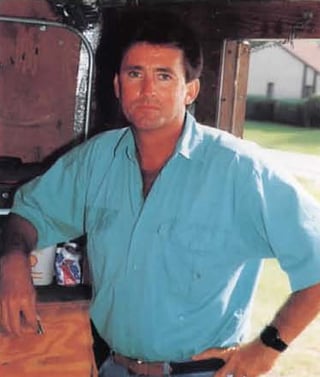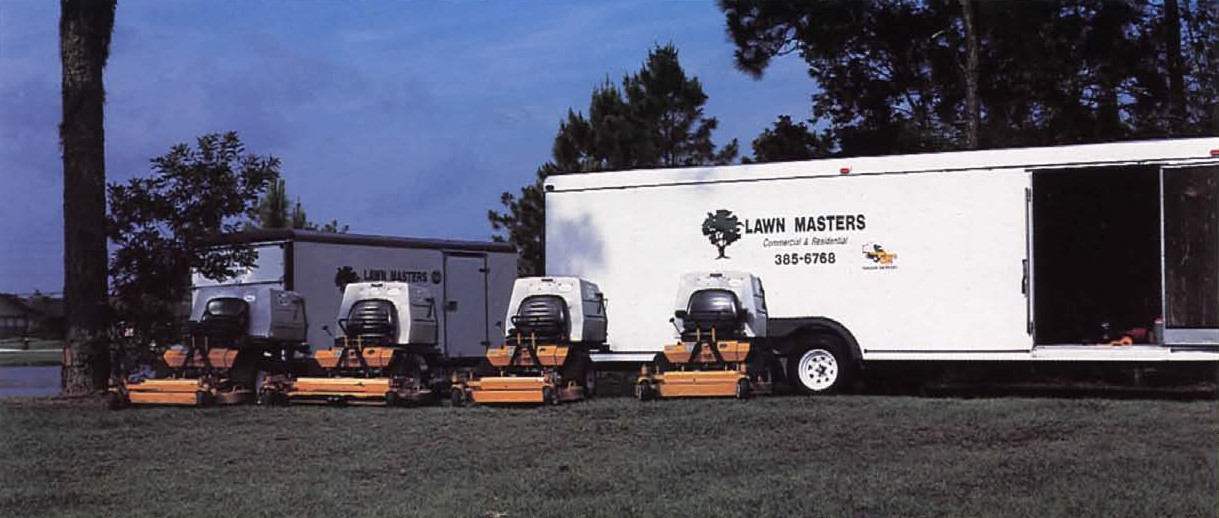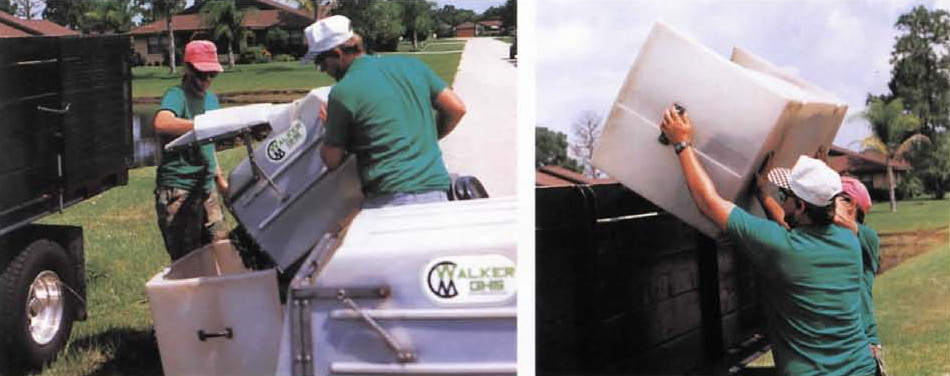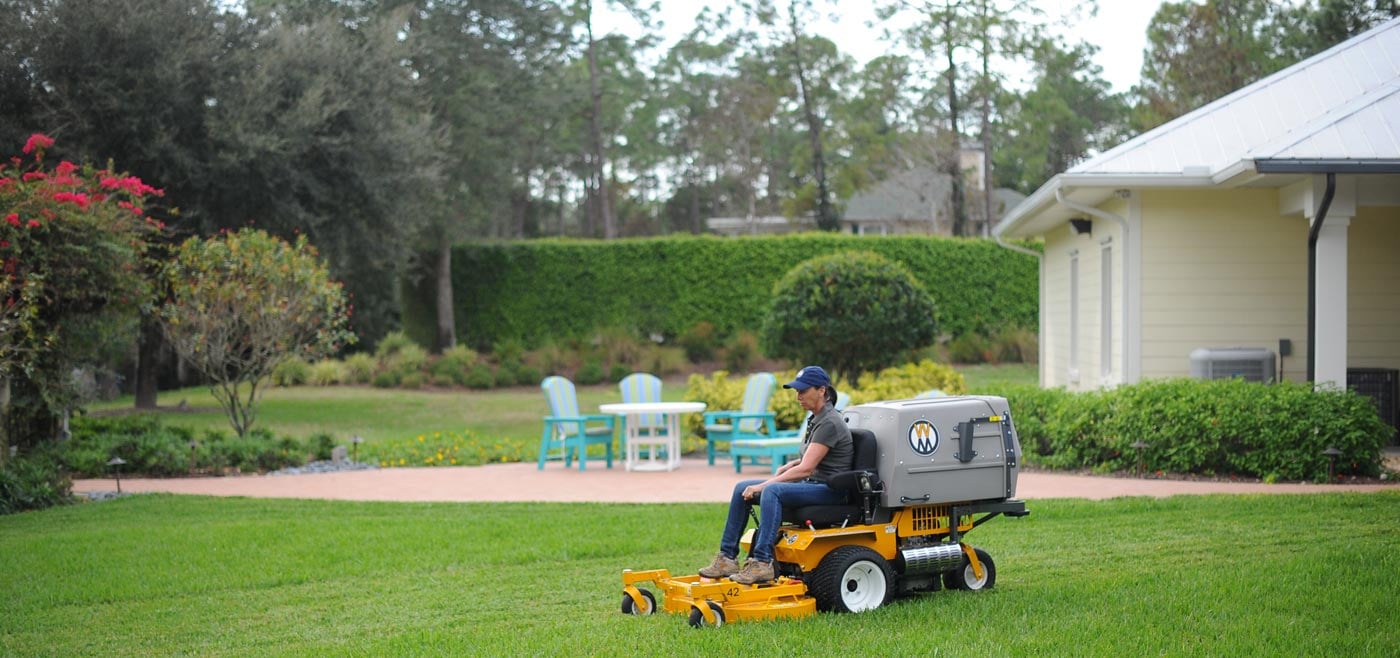When Jim Dubberly saw the light, it had nothing to do with the house he was wiring. He was observing a mowing crew tackle the new housing development in which he worked, and thought he could do a better job mowing and improve his lifestyle doing it.
So it was, eight years ago. Jim talked the developer and the board into giving him a chance to maintain the property. He gave up his vocation as a journeyman electrician and formed Lawn Masters, Sebring, Florida.
Finding a better way has since been the key to keeping this relatively new maintenance firm growing and profitable.
 Unusually Speaking
Unusually Speaking
To hear Jim tell it, there is nothing unusual about his business. Warning! Humble people usually have the most to share.
Just as an example, three of Lawn Masters' five Walker mowers were purchased in 1988 and '89. Each has logged somewhere between 2,400 and 2,800 hours mowing the state's notoriously tough Bahia grass. The mower decks and engines were replaced prior to this mowing season - but these vital parts are still going - on competitors' Walkers.
To be sure, there's something special about the way Jim treats his equipment. He also has discovered the ideal way to transport, maintain and store his equipment - right inside two enclosed trailers. One of his trailers is set up with a generator, air compressor and enough parts to keep his mowers going, with minimal downtime. There's plenty of room inside, too, for crews to take breaks and to change clothes, all requisites thanks to Florida's summer heat and humidity.
Finding a better way even creeps into operating procedures. With only three maybe four employees plus himself, Jim has to cover a lot of ground to maintain 250 properties. Anything that saves time, saves energy and money, especially during fast-growing summer months when grass jumps an inch a day.
"Rain, high humidity and sprinklers mean that lawns generally don't dry out until 10:00 a.m.," notes Jim. "But we used to mow early anyway, just to be able to get the work done. The going was slow and mowers used more fuel to get less done." Not anymore. Last year, he bought a string trimmer for all of his employees, and they've since used them in concert until midmorning. Then they clean up and mow for the rest of the day. The new procedure didn't win Jim any popularity points, but it saves wear and tear on the mowers and lowers fuel costs. Jobs get done faster. too, simply because mowers operate only during optimum mowing conditions and all employees are mowing at one time.
Business Savvy
Lawn Masters' owner shies away from any comparison with high profile contracting firms or the fast moving executives who run them. In fact, Jim moved his family to Sebring from West Palm Beach to get away from the fast-paced life of the rich and famous.
"I don't have any business training and I don't have any grand plans," he tells. "I just want to make a good living." Mowing and maintaining lawns has obliged.
The move to Sebring reduced the Dubberlys' earning power substantially. In fact both electricians and nurses - Jim's wife's vocation - make half as much in Sebring as they do in West Palm Beach, but the couple thought the move was worth it. Still, the reductions were a bitter pill. Owning and operating a lawn maintenance business gave them an opportunity to grow their own destiny.
"When I told my wife about my mowing idea, he thought I was crazy," remembers Jim. The developer took him more seriously and so did the board after Jim presented the idea to them. He signed a one year contract to mow 120 retirement homes in the expanding Cormorant Point community.
The first year, he mowed the property with a combination of midsize walk mowers and garden tractors. The following year, he saw an ad for a Walker and bought one sight unseen. Two more the following year replaced the garden tractors.

'We were killing ourselves with the walk-behinds, and their grass catchers were constantly plugging. The garden tractors just didn't have the maneuverability," Jim explains.
Being one of the first contractors in the area to use a Walker, the machines gave him a competitive advantage in both speed and quality of cut. Lawn Masters no longer has a monopoly on the machine, Jim notes. Nearly every crew that goes by has a Walker. Why not, he asks rhetorically. "They're designed to pick up the high-moisture content Florida grass and move quickly in and around small properties."
Lawn Masters' mower lineup today includes five Walkers. The three early ones have 16-hp Kohler engines. The two newer ones have 20-hp Kohlers. All have GHS capability, although one 54-inch side-discharge deck is used for the common areas. Mulching during the growing seasons just isn't feasible, Jim adds.
Cattle Call
Lawn Masters handles as much grass as any Sebring contractor. In part because Cormorant Point is one of the few developments in the area that requires the removal of grass clippings. In part, too, because Jim has an economical way to dispose of it.
Twice daily, the company's 1-ton dump makes a trip to a nearby cattle farm where the animals ''literally stampede" to get a taste of the fresh cut grass.
Still, even with the Walkers and the cattle connection, Jim says handling grass is one of the most challenging aspects of his operation.
Truck loaders won't handle the wet grass, Jim reports, so crews wield a bucket - re-engineered from a sprayer tank - to lift clippings into the back of the truck. "It's primitive, but it works," he notes. "But there has to be a better way."

Since the clippings are used to feed cattle, Jim also has to pay special attention to application schedules. Cormorant Point's lawns, for example, are fertilized three times a year, each right after the lawns are mowed to give chemicals a week to play out.
Lawn Masters now maintains 186 properties at the development where Jim has wired about one third of the homes. And the company maintains 60 plus other nearby properties. At the retirement village, crews mow, blow and edge only. Homeowners take care of their other landscaping needs. The other properties have custom maintenance and landscaping contracts.
"One of the keys to making a decent living in Florida is to sign yearly contracts," Jim explains. "It's tough to make a profit in the summer when growing conditions are ideal. Slack, winter months help keep costs in line."
Another key is to find employees who will put up with the steamy, summer weather. Jim says he pays his employees as much as he can afford, but they earn it, he adds.
This entrepreneur is also choosy about the properties he maintains. Florida sand has the reputation of literally sand blasting decks, blades and blowers. Hence, Jim only maintains properties that are irrigated and lush. To do otherwise is to look at higher operating costs.
One other key, in Florida and elsewhere? Constantly be on the lookout for better mouse traps.




 Site Search
Site Search



